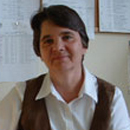Applied Mathematics
This program is not admitting new students
Students majoring in Applied Mathematics select either a field of application, or a concentration in Elementary or Secondary Education. Students majoring in Applied Mathematics with a field of application complete at least twelve mathematics courses (earning at least a C or higher in each course) and at least six approved courses in a field in which significant applications of mathematics are possible. In consultation with an academic advisor, students may design a single-discipline or multi-discipline field of application from academic programs such as business, economics, education, environmental studies, fashion, graphic design, sociology, or exercise science. Students apply mathematics to their field in papers, projects, and courses that culminate in a Capstone Seminar and an Internship. Graduates receive a Bachelor of Arts in Applied Mathematics and are prepared for many career opportunities in almost every sector of the job market, using mathematics for analysis, prediction, modeling, problem solving, and education.
By planning early in consultation with an academic advisor, students may be able to reduce the time it takes to complete a bachelor’s degree in Applied Mathematics to 3 or 3½ years.
The following goals and associated learning outcomes delineate what we strive for students to achieve when they complete the major program of study in Applied Mathematics.
Goal 1: Conceptualization
Upon completion of the major program of study in Applied Mathematics, students will be able to
- demonstrate understanding of principles, techniques, and applications in selected areas of mathematics
- identify mathematical concepts needed to solve problems
Goal 2: Organization
Upon completion of the major program of study in Applied Mathematics, students will be able to
- organize the principles and techniques of mathematics in a logical way to solve problems
- adapt and apply mathematical concepts to solve problems
Goal 3: Literacy skills
Upon completion of the major program of study in Applied Mathematics, students will be able to
- read and understand mathematical writing
- write using the notation and nomenclature of mathematics
- create mathematical charts, graphs, figures, and diagrams
| Course Code | Course Title | Credits |
|---|---|---|
| Core Courses | ||
| MATH205 | Calculus I | 4 |
| MATH206 | Calculus II | 4 |
| MATH208 | Statistics | 3 |
| MATH212 | Finite Mathematics | 3 |
| MATH307 | Calculus III | 4 |
| MATH320 | Differential Equations | 4 |
| MATH325 | Linear Algebra | 3 |
| MATH399 | Mathematical Applications | 3 |
| MATH499 | Internship | 3 |
| Choose 3 from the following: | ||
| MATH207 | Applied Trigonometry | 3 |
| MATH210 | Math Applied to Science | 3 |
| MATH328 | Mathematics Applied to Management | 3 |
| MATH330 | Mathematical Modeling | 3 |
| MATH338 | Mathematical Statistics | 3 |
| See Advisor/Catalog | ||
Six courses in a Field of Application: 18 Credits
A Field of Application consists of six courses (approved by the Math/Science Chair) from another department at the College. An interdisciplinary Field of Application consists of six approved courses from two or more departments. Of the six courses, at least two must be at the 200-level or higher and at least one must be at the 300-level.
Major Requirements: 58 credits
Core Curriculum Requirements: 24-30 credits
Unrestricted Electives: 32-38 Credits
Minimum credits required for graduation: 120
MATH106 - Algebraic Operations
This course is intended to strengthen students’ ability in algebra. The course begins with introductory topics such as operations with real numbers, linear equations and inequalities, polynomials and factoring, quadratic equations and systems of equations. This course also includes an introduction to rational expressions, radicals and rational exponents.
MATH107 - College Geometry
This course is an introduction to the essentials of Euclidean geometry. Topics covered include: reasoning in mathematics, the relationship between algebra and geometry, analytic geometry, proofs and constructive triangles, circles, quadrilaterals, polygons, surfaces and solids and historical notes about famous geometricians. Prerequisite: MATH 106 with a grade of C or better or demonstrated competency through placement testing.
MATH109 - Modern Mathematics (KP)
This course is an introduction to mathematics developed in the last 100 years. The course connects recently-discovered mathematics with current, real-world problems. Aesthetic elements of mathematics are emphasized. Topics may include the mathematics of voting, sharing, touring, games, networks, scheduling, money, symmetry, fractal shapes, descriptive statistics and probability. The course is appropriate for students majoring in Communication, Criminal Justice, English/History/Humanities-with Secondary Ed, English, Environmental Studies, Fashion Design, History, Hospitality and Event Management, Humanities, Human Services, Law and Public Affairs, Legal Studies, Psychology, Sociology, or Sport Management. Prerequisite: MATH 106 with a grade of C or better or through placement testing.
MATH116 - Merchandising and Financial Mathematics
This course focuses on retail mathematics. Topics include simple and compound interest, the time-value of capital, annuities, amortization, sinking funds, bond and investment, business problem-solving and decision making. Other topics include profit, loss, and break-even analysis, pricing, inventory, and merchandise planning. The course introduces basic theories of statistics. Prerequisite: MATH 106 with a grade of C or better or through placement testing.
MATH203 - Precalculus
This course prepares students for the study of calculus, physics and other courses requiring precalculus skills. Included is a review of algebra, coordinate geometry, the solution of systems of equations, and the analysis and graphing of linear, quadratic, inverse, polynomial, and rational functions. There is a thorough treatment of exponential, logarithmic, and trigonometric functions. An important goal is for students to develop a geometric understanding of functions and their properties. Prerequisite: MATH 106 with a grade of C or better or demonstrated competency through placement testing. Restrictions: not open to students who have completed 205, 206, or any 300 level mathematics course successfully.
MATH205 - Calculus I
This course is an introduction to limits, continuity, and methods of differentiation. Application to problems in business management and physical science is emphasized. Prerequisite: MATH 203 with a grade of C or better or demonstrated competency through placement testing. Restrictions: not open to students who have completed MATH 206, or any 300 level mathematics courses.
MATH206 - Calculus II
This is a continuation of Calculus I, covering integration, functions of several variables, partial differentiation, maxmin problems, derivatives and integrals of trigonometric functions and differential equations with applications to business, biological sciences, and physical sciences. Prerequisite: MATH 205 with a grade of C or better or demonstrated competency through placement testing. Restrictions: not open to students who have completed MATH 320, MATH 328, or MATH 330.
MATH207 - Applied Trigonometry
This course is an in-depth study of trigonometry with attention to theory, proofs, modeling, and history. Trigonometric and related functions are used to model, analyze, and solve real-life problems. Applications are chosen from disciplines such as agriculture, architecture, astronomy, biology, business, chemistry, earth science, engineering, medicine, meteorology, and physics. Topics covered include a review of trigonometric functions, right triangle trigonometry, analytic trigonometry, vectors and dot products, complex number theory, trigonometric forms of complex numbers, exponential, logarithmic and trigonometric models, Gaussian and logistic growth models, conic sections, and polar equations of conics. Prerequisite: MATH 205 with a grade of C or better.
MATH208 - Statistics
This is an introductory course in descriptive and inferential statistics with an emphasis on applications in business and the social and biological sciences. Topics include: data analysis, and graphical methods of describing data, measures of central tendency and variability, probability, the normal distribution, sampling distributions, confidence intervals, hypothesis testing, correlation, and regression analysis. Prerequisites: MATH 106 with a grade of C or better or demonstrated competency through placement testing and ENG 102.
MATH210 - Math Applied to Science
This course provides a review of fundamental mathematical concepts such as probability and trigonometric, exponential and logarithmic functions and explores the ways that these topics and techniques have been applied to investigations in architecture, calculus, exponential growth and decay, logarithmic scales, earthquake analysis, astronomy, biology, medicine, genetics, radiocarbon dating, chemistry, and Newtonian physics. The course is designed to demonstrate the power and utility of mathematics and explores the development of mathematics during the Middle Ages and the Renaissance, especially in Greek, Hindu and Arabic cultures. Prerequisite: MATH 205 with a grade of C or better.
MATH212 - Finite Mathematics
The focus of this course is to develop mathematical models and to demonstrate the utility of various mathematical techniques that are most applicable to the creation of computer algorithms. Topics include functions and models, linear regression, solving systems of linear equations using matrices, matrix algebra and Leontief Input-Output models, linear programming (graphical and simplex methods), principle of duality, estimated and theoretical probability and Markov Chains. Applications are derived from current real world data and require mastery of Microsoft Excel and graphing calculator technology. Prerequisite: MATH 206 with a grade of C or better.
MATH215X - Discrete Math
Topics will include logic, proofs, algorithms, counting, recurrence relations, graph theory, trees, networks, Boolean algebra, and automata.Prerequisite: C or better in MATH 205
MATH301 - Mathematical Modeling
Mathematical ModelingPrerequisite: C or better in MATH 205, 206, and 208
MATH304 - Mathematics for Educators
This course engages students in mathematical concepts through examples, investigations, and active problem solving explorations. Content is drawn from subject matter knowledge required for elementary and early childhood licensure, with emphasis on number theory and operations. This course is for students seeking elementary or early childhood licensure. Concurrent enrollment in ED 335 is required.
MATH307 - Calculus III
This course is an introduction to sequences and series, parametric and polar curves, vectors and vector functions, partial derivatives, multiple integration, and vector calculus. Prerequisite: MATH 206 with a grade of C or better.
MATH320 - Differential Equations
This is an introduction to the many ways of solving various types of differential equations with emphasis on theory, methods of solution and applications. Topics include solutions of first, second and simple higher order differential equations, homogeneous and non-homogeneous equations, solutions of systems of differential equations using the theory of matrices, and determinants. Prerequisite: MATH 206 with a grade of B- or better.
MATH325 - Linear Algebra
This is an introductory course in linear algebra blending the requirements of theory, problem solving, analytical thinking, computational techniques, and applications. Topics include in-depth treatment of matrix algebra, linear systems, vector spaces, linear transformations, determinants and computer methods, as well as applications and modeling of real phenomena in transportation systems, archaeology, economics, communications, demography, weather prediction, connectivity of networks, graph theory, and fractals. Prerequisite: MATH 206 with a grade of C or better.
MATH328 - Mathematics Applied to Management
This course explores the art of mathematical modeling of managerial decision problems and the science of developing the solution techniques for these models. Topics include management science techniques used in today’s businesses, e.g., break-even analysis, presentation models, linear programming, transportation and assignments problems, decision theory, forecasting and inventory models, Markov analysis, and solution of nonlinear models in business using calculus-based optimization. Prerequisite: MATH 206 with a grade of C or better.
MATH330 - Mathematical Modeling
This is an application-oriented course on how to solve real word problems from the social, medical and life sciences, business, and economics by setting up a mathematical model of the situation and then developing techniques for analyzing these models and solving them. Topics include the modeling process, linear models, financial models, modeling using proportionality, fitting linear and nonlinear models to data graphically, the least-squared criterion, linear programming models, modeling using the derivative, matrix and probability models, Markov chain models, and modeling interactive dynamic systems. Prerequisite: MATH 206 with a grade of C or better.
MATH338 - Mathematical Statistics
In this introduction to statistical theory, the roles probability and statistics play in business analysis and decision making are investigated. Topics include probability distributions, statistical inference, sampling distribution theory, and applications. Prerequisite: Math 206 with a grade of C or better.
MATH399 - Mathematical Applications
In this capstone course, Students investigate mathematics from a variety of fields and choose a topic for a mathematics project in their Field of Application. Mathematical methods for analysis, modeling, prediction, and/or problem solving are discussed. Students demonstrate knowledge of a substantial area of mathematics and present their work at a department seminar or the Connected Learning Symposium.
MATH499 - Internship
The internship seminar is a work or research experience where students combine theory and practice.

Ron Laham
Assistant Professor of Athletic Training/ Exercise Science
Office: Alexander STC
Email: RLaham@lasell.edu
- Graduate Catalog
-
Undergraduate Catalog
- Core Student Learning Outcomes
- Core Curriculum Requirements
- Course Descriptions
- Academic Information
- Academic Policies
-
Programs of Study
- Undergraduate Minors
- Accounting
- Applied Mathematics
- Arts Management
- Athletic Training
- Communication
- Criminal Justice
- Education
- English
- Entrepreneurship
- Environmental Studies
- Event Management
- Exercise Science
- Fashion
- Finance
- Fitness Management
- Global Engagement
- Graphic Design
- Health Science
- History
- Hospitality Management
- Human Services
- Humanities
- Individualized Studies: IDS
- International Business
- Law and Public Affairs
- Legal Studies
- Management
- Marketing
- Pre-Law
- Psychology
- Resort and Casino Management
- Sociology
- Sport Management
- Undeclared Option
- Undergraduate Admission
- Past Catalogs



